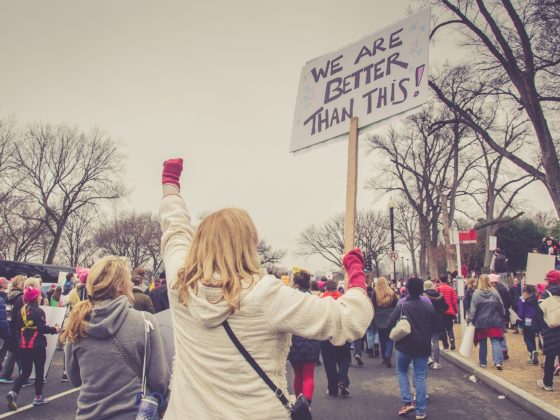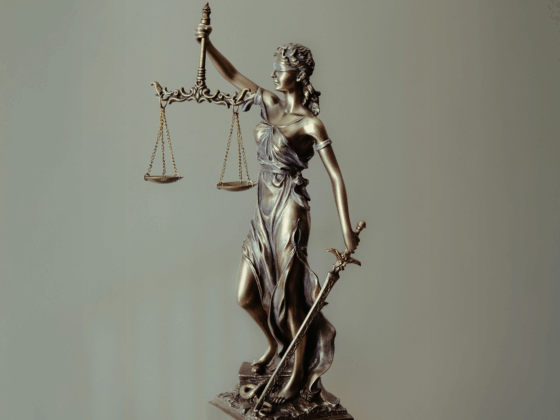A video circulated the internet earlier this year depicting a black, female University of Virginia student announcing that there were “too many white people” using the multicultural student center. This quickly drew criticism, with many denouncing it as patently racist. The incident recalls a similar controversy from The Evergreen State College, when white students and faculty were expected to leave campus for a day. And just recently, a story came out about the Claremont Colleges planning a blacks-only LGBT social event.
The criticism of such news usually paints the responsible actors as left-wing segregationists who somehow miss the irony of their intolerance. This is a fair critique, but as people eager to rebuff the ideology, we can’t merely lob unsavory characterizations and call it a day. These Social Justice segregationists aren’t stupid, evil, irrational, or ignorant. They’re people with a remarkably coherent belief system, and we should do well to understand the fundamental beliefs and moral considerations that underpin the ideology.
As individualists, we think that when two people interact, the exchange is occurring between only two people. But instead of this interpersonal perceptive, Social Justice types see such interaction as inter-collective. In other words, I’m not engaging with you. Rather, it’s the essence of my group imbued within a body that engages with the essence of your group imbued within a body. We’re not individuals, but representatives of ethnic collectives, constrained to intergroup diplomacy. This is why people so often preface what they’re about to say with declarations of group membership: “As a white man,” “As a woman of color.” There is no I, only we. And there is no you—only y’all.
Some group identities are relevant to the ideology (black, white, gay, female) and some are not (Italian, German, Ohioan). And not all groups are equal, as they’re subject to the doctrine of ethnohistorical determinism, in that the history of an ethnicity determines its moral value and character. It doesn’t matter if a white person has never owned a slave. His character, determined by the history of his ethnic group, is permanently stained with the atrocity of slavery.
To an individualist, the UVA student is engaged in a racist call for segregation. But to the student, creating a non-white space is not about intolerance or antipathy—it’s about promoting peace. In her worldview, blacks and whites (specifically, non-whites and whites) are inherently incompatible—one fundamentally oppressed, and the other inherently oppressive. Thus, the only way to mitigate oppression and achieve a peaceful society is to segregate. This is a common rationale of separatist ideologies, be Frantz Fanon’s Algerian Nationalism, Richard Spencer’s white separatism, or radical separatist feminism. For the sake of the cats, they must be kept apart from the dogs.
“Segregationism,” of course, is not the term used by the Social Justice types. Instead, they call it “centering” in that people must “center” the space (or conversation) on the groups that are otherwise oppressed. It’s a remarkably effective euphemism, as centered water fountains and centered bus seats no doubt have a much softer ring to them.
As with any belief system, this Social Justice ideology has a clear conceptualization of good and evil. But instead of the line between them split within the heart of every man, as Aleksandr Solzhenitsyn would have it, or a more Christian conceptualization of people being born closer to evil and compelled to work towards to good of salvation, this worldview pushes the Good/Evil paradigm externally onto specific ethnic groups. To them, evil is heritable, born in history and transmitted across generations like male-pattern baldness or freckles. Racism is a genetic disposition, and though you can’t help it, it’s best to keep you separate from those you would otherwise inevitably harm.
This ideology provides a sense of meaning (in a Marxian Good versus Evil sense), purpose (in that fighting oppression is the calling) and virtue (in that protesting the oppressed from their oppressors is good). To its adherents, this is a righteous belief system. It’s insufficient, then, to simply call-out the apparent hypocrisy of the surface-level manifestations of the philosophy. The correct response, after understanding the fundamentals of their beliefs, is to make the clear case for the philosophy of individualism.
If people wish to voluntarily associate with their ethnic group, more power to them. Ethnic ties are often a great basis for fostering community—whether it’s food, culture or religion, people get along with people who like similar things. But these associations must be voluntarily built by individuals under their own volition. There is a world of difference between individuals voluntarily associating with whomever they like, and the doctrine of binding people to fundamentally juxtaposed ethnic groups. The latter—ethno-collectivism—enslaves man to the mob of his likeness, crushing the spirit of the unitary person under the tyrannical ethos that there is no you.
Individualism, on the other hand, recognizes the unique essence of all persons and allows for relationships to be built across lines that would otherwise be reinforced. It is the course by which we transcend racial tension. We are not mortal enemies by circumstances of our birth. And while the ethno-collectivists prop themselves up by riding the coattails of great men that came before and damning the progeny of the wicked, the truth is that you do not have to answer for the ill deeds of any others—you are entirely responsible for your own virtue. Ethnicity is no substitute for a soul. And that soul—the I—is the being that acts, thinks, and lives independent of any superficial or historical characteristics. Peace flourishes when men recognize this, that those unlike himself are individuals on an alternate path, equals in the freedom to pursue their own ends. Instead of engaging in the righteous tribalism of Social Justice, we must recognize the infinite diversity of mankind, a plurality, as Ayn Rand says, of the smallest minority on Earth—the individual.













7 comments
“If the historic oppressors are not obliged to confront, acknowledge, or redress their historic oppression…”
One problem. I believe in individualism. I acknowledge no tribe, only my species. I have never held slaves, lynched anyone, passed a Jim Crow law. My hands are clean. My ancestors arrived after slavery ended and themselves were treated as second class citizens. I seek no reparations for myself.
” They’re people with a remarkably coherent belief system, and we should do well to understand the fundamental beliefs and moral considerations that underpin the ideology.”
I clicked on the link “belief system” which you call “remarkably coherent.” It’s the most insane gobbledy goop I’ve ever encountered.
That is a dangerous strategy. In Game Theory, there is a theoretical problem called the Prisoner’s Dilemma (look it up if you don’t know it). Two prisoners are accused of the same crime, but not enough evidence exists to convict one of them specifically. Both have the choice of either keeping their mouth shut (i.e. cooperate with the other prisoner) or testifying against the other prisoner (betrayal option). If both choose cooperate, both get a small fine and will be released. If both choose betray and testify against the other, no conviction is possible, and both will be released, again with a small fine. However, if one cooperates and the other betrays, then the betrayer gets set free without a fine, and the betrayed prisoner gets a hefty prison sentence.
How do you “win” the Prisoner’s Dilemma, i.e. get the maximum result? By choosing the betray option yourself, while convincing the other prisoner to choose the cooperative option. You get the maximum beneficial result while the other gets the worst possible result.
The political equivalent comes in the form of two social options: the colorblind social contract in which you treat everybody the same, regardless of race (cooperative option), or the tribalist option, in which you only support your own ethnic group (betray option).
If a white person chooses tribalism (favor own group), he immediately gets shouted down as a racist. Thus white people are socially pressured into choosing the colorblind social contract. This leaves non-white people free to choose the tribalist option, i.e. only work for the benefit of their own group. Per the Prisoner’s Dilemma theory, this leads to white people getting the worst result, and non-white people getting the best result.
TPD is not accurately described, nor correctly applied. In a classic Prisoners’ Dilemma matrix there are no good outcomes, as opposed to the marketplace where rational actors can achieve mutually agreeable outcomes. The prosecutor has two prisoners dead to rights on stolen goods charges (2 years). She knows the two committed armed robbery (5 to 10) but can’t prove it without a confession. The prisoners are isolated in separate cells and cannot communicate; she offers them each the same deal: “I’ve got you on stolen goods, you’re doing 2 years. Confess. If you betray your partner and he stonewalls, he’ll get the max 10 years and you’ll be out in one year for cooperating. If you stonewall and your partner flips, you’re doing 10 and he’s free in one. Of course, if you both confess…I’ll make sure you do the minimum for the crime: 5 years”.
The prisoners can’t communicate, both face the same conundrum. In trying to maximize individually they risk a worse outcome than in both standing pat: knowing the criminal code to never talk, there is opportunity in breaking it…but if there is no honour among thieves each might betray the other…and so it goes, round and round.
What then IS the rational principle? Individual Maximization fails, trapping us in that loop where we both confess and do 5 hard years because we’re afraid of 10. My father David (who has thought about this quite a bit 😉 believes the rational principle here is Optimality. {(-1/-10),(-5/-5),(-2/-2),(-10/-1)}
Let’s consider The (philosophically informal) Golden Rule as a representation of ethical behaviour (to be clear, this is me talking, not my dad). Our prisoners may have violated TGR in the context of the society against which they have transgressed (and which is embodied in the prosecutor etc); however they chose their own outlaw society and accepted its rules, and the action of stonewalling the prosecutor is consistent w TGR in the relevant context ie: you don’t rat out your partner. And this results in optimality: (-2/-2), the least bad outcome for all members of the collective that chose a path of action leading to a situation (their capture / the reassertion of the overarching society), wherein further choices are all undesirable.
Moving on…
Your idea that white people choosing according to their tribe are accused of racism, misses the point. If the historic oppressors are not obliged to confront, acknowledge, or redress their historic oppression; if instead they continue as if the current state of affairs is a reasonable mutual starting position, then they are continuing the oppression. When you have enjoyed great privilege for a long time (eg from birth), giving it up will feel personally painful; even as everybody else rejoices in justice finally being done, and being seen to be done.
Great piece which gets to the heart of the problem! Individualism was the wonderful invention of the English Enlightenment which via John Locke was transmitted to the USA. But Individualism in itself is not enough. If we are not to be just isolated and warring human atoms the individual has to be embedded in a universal Humanity and a shared human nature. This allows resolution of conflict by appealing to the 99.9% which unites us as humans rather than the 0.1% of racial or other difference.
“crushing the spirit of the unitary person under the tyrannical ethos that there is no you.”
Contrary to popular opinion, the concept of individualism, autonomy, and any reasonably conceived concept or idea of a personal freedom to live and thrive within a society unburdened from the need to self-express only in terms of any form of mob mentality – was not invented in America and indeed, thrives and prospers in many parts of the globe.
In other words, humans are not ants. Or worker bees. Or herring.
It is in individuality we find that elusive “you.”
The old axiom, ‘divide and conquer’ is what I believe plays the fiddle here.
What becomes so obvious to the individual – is the absolute divisiveness of an ideology bent on keeping people apart.
Humans have been known to be inexorably social.
All to the good.
It is a thing that saves us from the several trillions of calamities that easily could happen, but don’t, largely because we have learned how to actually care about each other.
The roots of that are person to person.
Any attack upon this fundamental achievement is probably just about the most anti-social thing I can think of.
Dear Shaun!
Thanks you for this essay!
You, it seems to me, have come very close to unraveling the phenomenon of Social Justice. I’ll try to formulate this briefly and hope that you will be interested in this wording:
The ideology of Social Justice is the ideology of those who failed to become a person, an individual.
Take a close look at these “warriors”. Quite often they are formally educated, they have nice diplomas from prestigious universities, they never struggled for existence, but in the subconscious (the subconscious never lies!) they feel their own emptiness and the meaninglessness of their existence. It’s precisely this that unites them into packs fighting for what they name “justice”. Only inside the pack do they feel significant, only inside the pack does their existence get sense.
This, by the way, is one of the reasons why social justice is flourished in academic circles. It is here that losers thrive who want to look like Einsteins, but who have neither mind nor talent for this.